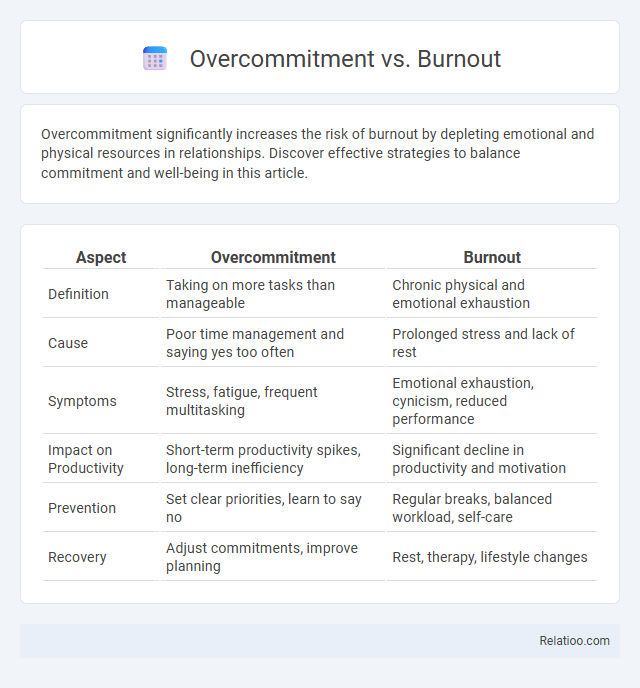Overcommitment significantly increases the risk of burnout by depleting emotional and physical resources in relationships. Discover effective strategies to balance commitment and well-being in this article.
Table of Comparison
| Aspect | Overcommitment | Burnout |
|---|---|---|
| Definition | Taking on more tasks than manageable | Chronic physical and emotional exhaustion |
| Cause | Poor time management and saying yes too often | Prolonged stress and lack of rest |
| Symptoms | Stress, fatigue, frequent multitasking | Emotional exhaustion, cynicism, reduced performance |
| Impact on Productivity | Short-term productivity spikes, long-term inefficiency | Significant decline in productivity and motivation |
| Prevention | Set clear priorities, learn to say no | Regular breaks, balanced workload, self-care |
| Recovery | Adjust commitments, improve planning | Rest, therapy, lifestyle changes |
Understanding Overcommitment: Definition and Causes
Overcommitment occurs when You take on more responsibilities than can be realistically managed, leading to chronic stress and decreased productivity. It stems from factors such as perfectionism, difficulty saying no, and a strong desire to please others or achieve excessive goals. Recognizing the definition and causes of overcommitment is essential to prevent burnout and maintain a healthy work-life balance.
What is Burnout? Key Symptoms and Stages
Burnout is a psychological syndrome resulting from chronic workplace stress that has not been successfully managed, characterized by emotional exhaustion, depersonalization, and reduced personal accomplishment. Key symptoms include persistent fatigue, cynicism towards work, decreased efficiency, and feelings of helplessness or detachment. The stages of burnout typically progress from the honeymoon phase of high enthusiasm to chronic stress, cynicism, and finally, burnout characterized by exhaustion and disengagement.
The Relationship Between Overcommitment and Burnout
The relationship between overcommitment and burnout is critical, as overcommitment often serves as a primary predictor of emotional exhaustion and reduced performance. When you consistently allocate more time and energy than sustainable, your risk of burnout escalates due to prolonged stress and insufficient recovery. Addressing overcommitment by setting boundaries and prioritizing self-care is essential to preventing burnout's negative impact on mental health and productivity.
Warning Signs: How to Identify Overcommitment
Warning signs of overcommitment include persistent fatigue, declining productivity, frequent stress, and neglect of personal needs. Individuals may experience irritability, difficulty concentrating, and a constant feeling of being overwhelmed despite a heavy workload. Recognizing these early indicators can prevent burnout by encouraging timely adjustments to workload and self-care practices.
Recognizing Early Indicators of Burnout
Recognizing early indicators of burnout involves identifying symptoms such as chronic fatigue, decreased productivity, and emotional exhaustion before they escalate. Overcommitment often leads to these signs, as taking on excessive responsibilities without adequate rest disrupts work-life balance and mental health. Monitoring stress levels and setting realistic goals can prevent burnout by addressing overcommitment promptly.
Psychological and Physical Health Impacts
Overcommitment often leads to increased stress and reduced recovery time, which significantly affects both psychological and physical health by heightening anxiety and fatigue levels. Burnout results from chronic workplace stress that remains unaddressed, causing emotional exhaustion, depersonalization, and diminished personal accomplishment, accompanied by symptoms such as chronic headaches and cardiovascular issues. Recognizing the cyclical nature of overcommitment and burnout is crucial for implementing effective mental health interventions and promoting physical well-being.
Workplace Culture: How It Fuels Overcommitment and Burnout
Workplace culture significantly influences overcommitment and burnout by promoting unrealistic expectations and glorifying long hours, which can pressure employees to sacrifice personal well-being for productivity. You may experience burnout when continuous overcommitment erodes your work-life balance, leading to decreased motivation and chronic stress. Cultivating a supportive culture that values boundaries and realistic workloads is essential for preventing the damaging cycle of overcommitment and burnout.
Strategies to Manage Overcommitment
Effective strategies to manage overcommitment include prioritizing tasks based on urgency and importance, setting clear boundaries for work and personal time, and learning to say no to additional responsibilities that exceed your capacity. Regularly assessing your workload and delegating tasks when possible helps maintain balance and prevent burnout. Incorporating mindfulness practices and scheduled breaks supports mental well-being while enhancing productivity during busy periods.
Preventing and Recovering from Burnout
Preventing burnout requires recognizing the signs of overcommitment and setting clear boundaries to maintain a healthy work-life balance. Your recovery process involves prioritizing self-care, seeking support from peers or professionals, and adjusting your commitments to manageable levels. Implementing regular breaks and mindful time management strategies can significantly reduce the risk of burnout and promote long-term well-being.
Building Sustainable Habits for Long-Term Wellbeing
Balancing overcommitment and burnout requires building sustainable habits that protect your long-term wellbeing by setting realistic goals and prioritizing self-care. Recognizing your limits and incorporating regular breaks fosters resilience and prevents the exhaustion associated with chronic stress. Developing consistent routines that include time for rest, exercise, and mindfulness sustains energy levels and supports mental health over time.

Infographic: Overcommitment vs Burnout
 relatioo.com
relatioo.com